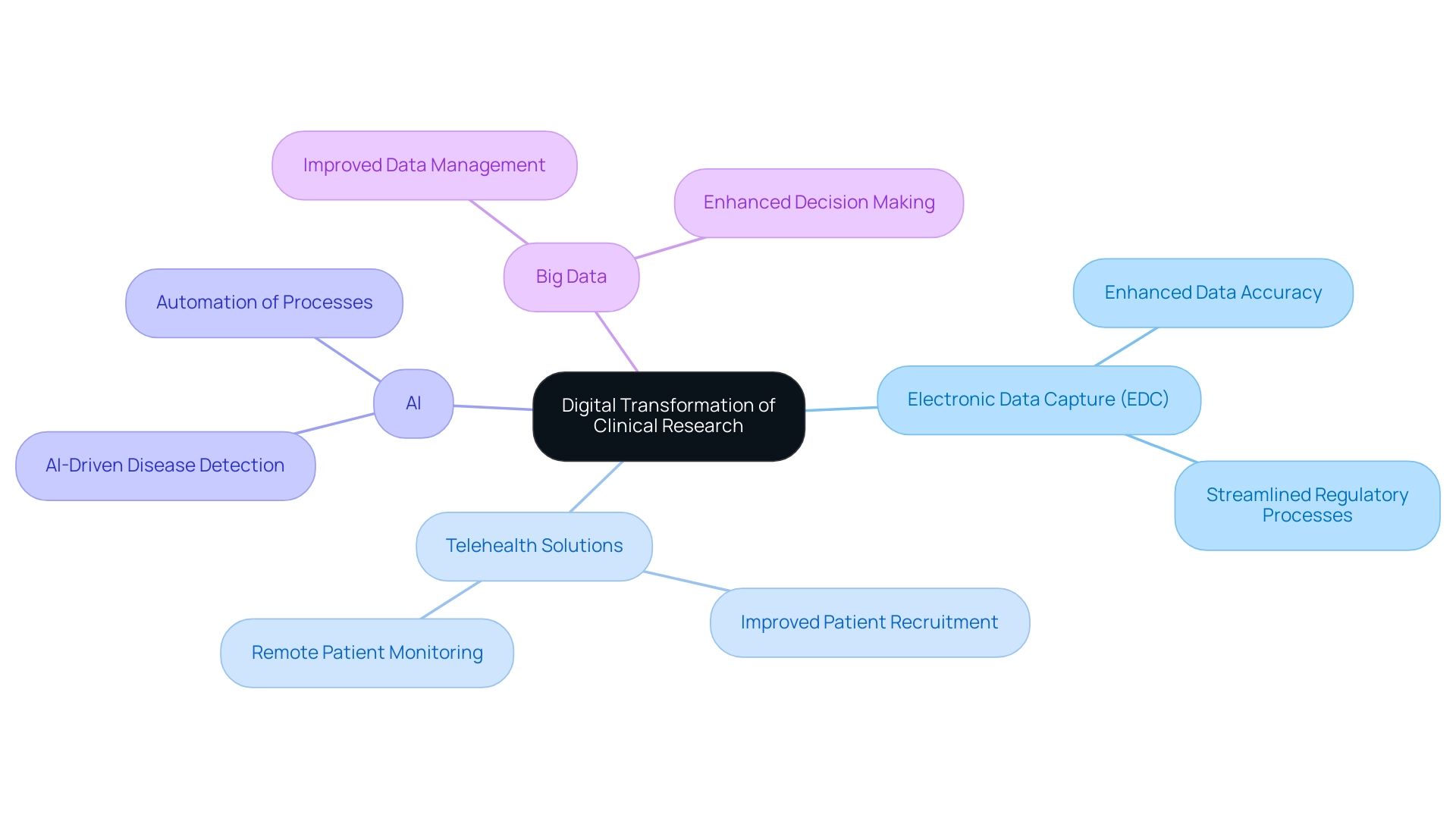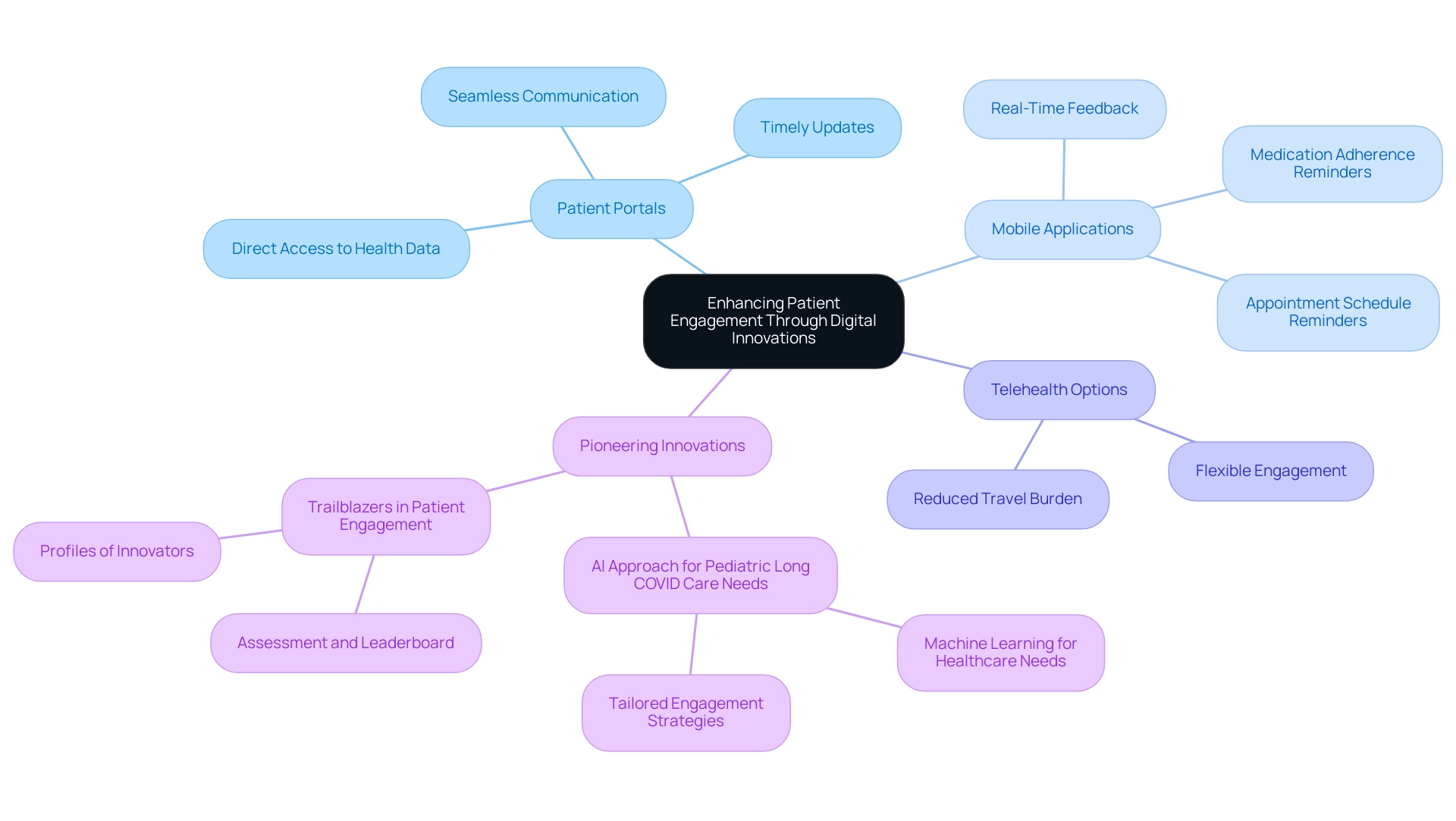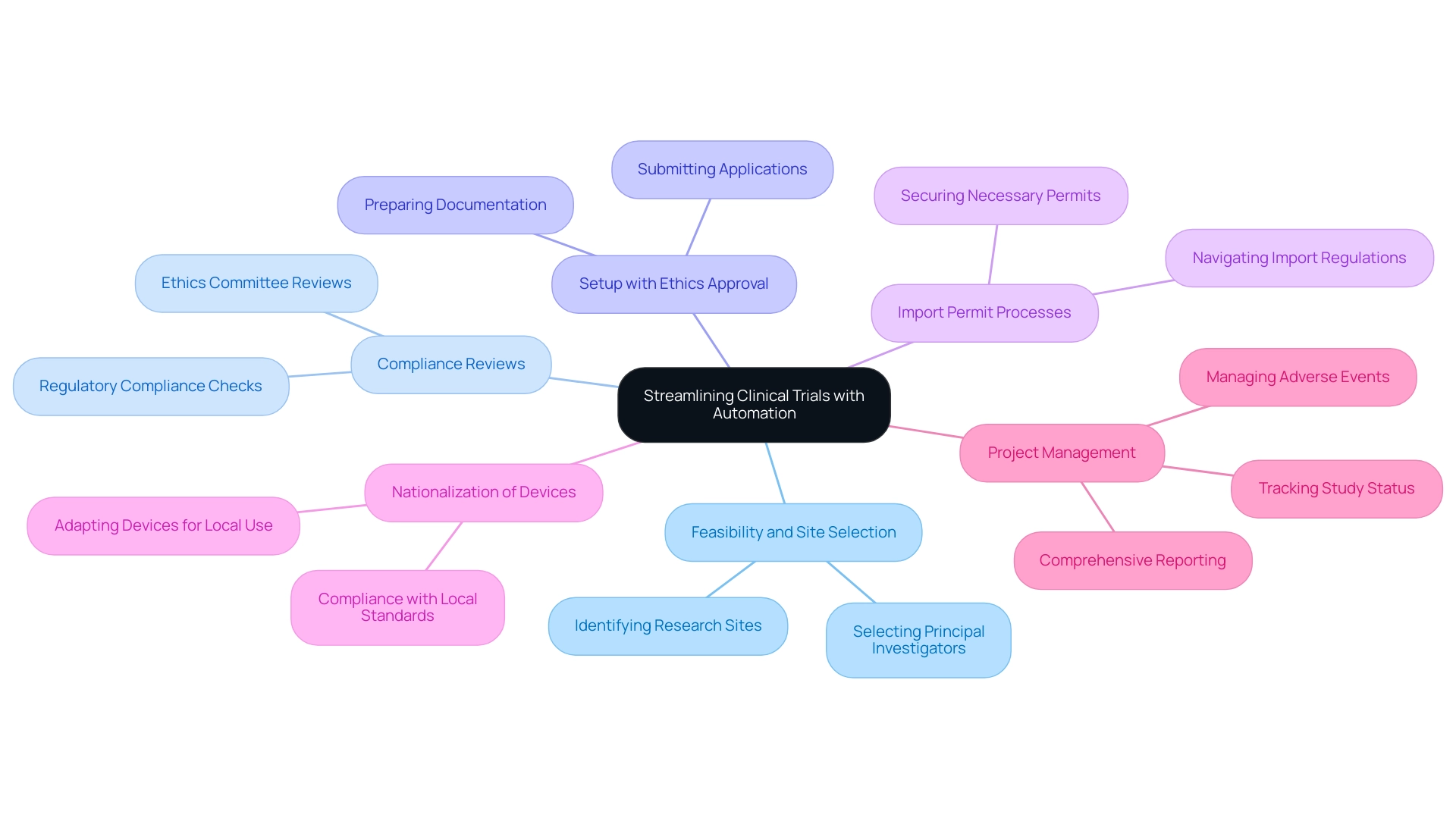Overview
Digital tools are transforming clinical research by enhancing data accuracy, improving patient recruitment, and streamlining regulatory processes through technologies like electronic data capture systems and telehealth solutions. The article provides evidence of this transformation by citing successful case studies and the increasing adoption of AI and cloud technologies, which collectively lead to faster research timelines and better patient outcomes.
Introduction
The landscape of clinical research is undergoing a significant transformation, driven by the integration of digital technologies that enhance every facet of clinical trials. From electronic data capture systems to telehealth solutions, these innovations are not only improving data accuracy and patient engagement but also revolutionizing recruitment processes and regulatory compliance.
The case of GlobalCare Clinical Trials exemplifies this shift, demonstrating how digital tools can drastically reduce recruitment times and improve participant retention. However, the journey toward fully embracing these advancements is not without its challenges, particularly in regions like Latin America, where regulatory hurdles and resource fragmentation persist.
As the industry navigates these complexities, understanding the practical steps and strategic implementations of digital tools becomes essential for researchers aiming to remain competitive in a rapidly evolving environment.
This article delves into the multifaceted aspects of digital transformation in clinical research, offering insights into practical applications, patient engagement strategies, and the critical role of automation in streamlining trial processes.
The Digital Transformation of Clinical Research
The incorporation of electronic resources into healthcare studies illustrates how digital tools are transforming clinical research. Technologies such as electronic data capture (EDC) systems and telehealth solutions are proving instrumental in enhancing data accuracy, improving patient recruitment, and streamlining regulatory processes, which showcases how digital tools are transforming clinical research. A compelling example is GlobalCare Clinical Trials’ collaboration with bioaccess™, which has expanded its ambulatory services to Colombia, achieving over a 50% reduction in research subject recruitment time and a retention rate exceeding 95%.
As observed by Slava K., CEO of TATEEDA, since the technological transition of the early 2020s, Healthcare IT has truly taken center stage. Cloud technology, AI, and big data are now at the heart of healthcare, changing the game in how we manage care. This technological transformation exemplifies how digital tools are transforming clinical research by speeding up the rate of research studies while greatly improving the quality of information gathered, ultimately resulting in better patient outcomes.
Furthermore, IDx Technologies' partnership with bioaccess™ for data-licensing collaboration in Latin America underscores the importance of AI-driven disease detection in ophthalmology. However, Medtech companies in Latin America continue to face significant challenges, including regulatory hurdles, language barriers, and fragmented resources, which can impede effective communication and collaboration with American clinical trial clients. A recent case study involving SCRx Pharmacy, a prominent pharmaceutical distributor, showcased how automating drug orders and claims processing through advanced technological tools resulted in a remarkable fivefold reduction in manual workloads, driving enhanced accuracy and efficiency across operations.
Additionally, the U.S. government's investment in electronic health initiatives is further fueling how digital tools are transforming clinical research, providing a supportive environment for innovation. With 801 unique AI/ML-enabled devices obtaining FDA approval as of June 2024, the momentum for transformation in research is not only present but also ready for significant growth. This trend emphasizes how digital tools are transforming clinical research by showcasing the long-term potential for AI/ML-driven electronic health interventions, which will likely play a crucial role in influencing the future of clinical studies.
As the industry continues to embrace these innovations, understanding their implications becomes essential for researchers striving to remain competitive and compliant in a rapidly evolving landscape.

Practical Steps to Implement Digital Tools in Clinical Trials
- Assess Current Processes: Begin your journey by conducting a thorough evaluation of existing workflows to pinpoint areas ripe for enhancement through technological tools. Concentrate on recognizing repetitive tasks that automation could simplify, as this is essential in enhancing efficiency and ensuring compliance with study requirements, which is a key aspect of how digital tools are transforming clinical research. Furthermore, reflect on the consequences of the technological gap, as marginalized groups may encounter distinct obstacles that impede their involvement in research studies, affecting the overall efficacy of your investigation.
- Select Appropriate Tools: Engage in comprehensive research to select digital solutions that cater specifically to the unique requirements of your study. Options may include Electronic Data Capture (EDC) systems, patient management software, or advanced remote monitoring technologies. The appropriate instruments can greatly decrease the sample size needed for Phase 3 studies by up to 40%, as indicated by recent trial simulations. Moreover, matching resource selection with the requirements of various groups can assist in reducing obstacles and improving inclusivity, ultimately leading to more favorable results in research trials, which exemplifies how digital tools are transforming clinical research.
- Incorporate Import Permits and Nationalization: Ensure that your processes include obtaining necessary import permits and addressing the nationalization of investigational devices. This step is essential for adherence to local regulations and to promote the smooth advancement of your trials.
- Train Your Team: A successful implementation hinges on effective training. Ensure that all team members are well-versed in the new resources to maximize their utility and minimize potential disruptions during the transition. Emphasizing training on inclusivity can also help address the challenges faced by underrepresented groups, which is important in understanding how digital tools are transforming clinical research.
- Pilot Testing: Before full-scale implementation, conduct a pilot test with a small group. This step allows you to troubleshoot any issues and fine-tune processes, setting the stage for a smoother roll-out. Use this phase to gather insights on how the resources can better serve diverse populations and ensure compliance with local regulations regarding import permits and investigational device nationalization.
- Monitor and Adapt: After implementation, uphold a watchful stance by consistently observing the performance of the online resources. Proactively collect feedback from users to pinpoint areas for enhancement, ensuring that the tools develop in line with your research requirements. As Wilhelm and associates observe, utilizing digital platforms can improve therapeutic interventions, illustrating how digital tools are transforming clinical research, especially for marginalized groups, thus tackling some of the obstacles they encounter in research participation. Additionally, the 2022 State of Clinical Trial Operations Survey highlights how digital tools are transforming clinical research, emphasizing the need for collaboration between sites and sponsors in adopting remote technologies and the importance of monitoring and adapting to the evolving landscape.
- Engage Principal Investigators and Site Selection: Acknowledge the essential function of the principal investigator (PI) in the research process and ensure that site selection aligns with the study's objectives. Involving skilled PIs can elevate the standard of the study and boost participant recruitment and retention.
By adhering to these steps, stakeholders can not only optimize efficiency in research workflows but also conform to current best practices and new trends in technology adoption, ultimately influencing local economies through job creation, economic growth, and enhanced healthcare results.
Enhancing Patient Engagement Through Digital Innovations
Digital innovations play a pivotal role in enhancing patient engagement within clinical studies, demonstrating how digital tools are transforming clinical research through a growing reliance on technologies such as patient portals and mobile applications. Patient portals empower participants by providing direct access to their health data, timely updates, and seamless communication with research teams. This level of accessibility is crucial, as effective patient engagement is linked to improved retention rates; studies indicate that 2.9% of studies utilizing Patient Reported Outcomes (Pros) effectively guided dose-escalation decisions, showcasing the importance of participant feedback in study design.
Mobile applications further facilitate this engagement by enabling real-time feedback and sending reminders for medication adherence and appointment schedules. Such proactive measures can significantly bolster retention rates, leading to higher-quality data collection. Additionally, incorporating telehealth options introduces flexibility, allowing participants to engage in trials without the logistical burdens of travel.
A recent report highlighted trailblazers in patient engagement, assessing the latest innovations and their effectiveness in healthcare environments, including a leaderboard and profiles of these pioneers. The AI Approach for Pediatric Long COVID Care Needs exemplifies how machine learning can identify diverse healthcare requirements, ultimately addressing the specific needs of affected children. As an expert noted,
Past illnesses and comorbidities will affect how people report,
emphasizing the necessity for tailored engagement strategies.
By harnessing these digital tools, researchers can cultivate a participant-friendly environment that illustrates how digital tools are transforming clinical research by enhancing satisfaction and improving data integrity. Successful patient and public involvement in engagement (PPIE) fosters innovation in study designs, aligning them more closely with patient needs and ultimately promoting research.

Streamlining Clinical Trials with Automation and Data Management
In the evolving landscape of clinical studies, leveraging comprehensive clinical study management services is essential for efficiently managing repetitive tasks such as data entry, scheduling, and reporting, showcasing how digital tools are transforming clinical research. Our service capabilities encompass:
- Feasibility and selection of research sites and principal investigators
- Compliance reviews
- Setup with ethics committee approvals
- Import permit processes
- Nationalization of investigational devices
- Project management
As Rita Lazar-Tippe, Chief Digital Officer, stated, 'Our loan origination requirements were too custom for typical LOS tools, but Feathery was able to meet those standards while allowing us to launch 5x faster than building in house.'
This perspective underscores the effectiveness of tailored automation solutions in enhancing efficiency in testing. A comprehensive data management system plays a critical role in ensuring that data is collected, stored, and analyzed with precision, demonstrating how digital tools are transforming clinical research by minimizing errors and enhancing compliance. Significantly, there is a projected 20% rise in translation and interpretation positions between 2019 and 2029, illustrating the increasing need for automation in clinical studies.
The integration of cloud-based solutions is an example of how digital tools are transforming clinical research by facilitating real-time data access and encouraging collaboration among team members, which is essential for effective management. For instance, eClinical Solutions has made strides with AI/ML models that can drastically reduce the volume of records requiring review by 70-90%, significantly aiding in cycle time reduction and quality enhancement. Additionally, our reporting capabilities include comprehensive tracking of study status, inventory, and serious and non-serious adverse events, ensuring compliance and transparency.
The case study of CashCo Financial demonstrates that by unifying their loan application processes through automation, they achieved a 26% increase in approved loans and improved operational efficiency. By implementing such automation solutions and optimizing data management processes, researchers can concentrate on strategic decision-making, which illustrates how digital tools are transforming clinical research by reducing the burden of administrative tasks. This change not only speeds up testing timelines but also boosts the overall efficiency of medical research, highlighting how digital tools are transforming clinical research and fostering economic expansion and healthcare advancement through global cooperation and innovation in MedTech.

Navigating Challenges in Digital Adoption for Clinical Trials
Incorporating electronic resources into healthcare research can be fraught with challenges, including:
- Personnel resistance to change
- Integration difficulties with existing systems
- Escalating concerns surrounding data security
Notably, fewer than 10% of patients in the U.S. currently enroll in clinical trials, underscoring the critical need for improved engagement strategies. The recent case study on 'Multi-Stakeholder Collaboration for Digital Endpoint Development' highlighted the importance of collaboration among researchers, clinicians, patients, and technology experts to address these challenges effectively.
To navigate these hurdles, fostering a culture of openness and adaptability within your team is essential. Offering extensive training and continuous assistance can facilitate the transition process, while actively engaging team members in the selection of technological resources boosts their sense of ownership and dedication. Moreover, a recent survey showed that 83% of sponsors indicated readiness to share electronic Investigator Site Files (eISFs) with sites lacking them, signifying a favorable attitude towards technological tools.
Adhering to regulatory standards is essential to tackle data security issues, particularly considering conversations regarding the 2024 data security environment in research. The Knowledge Exchange event emphasized the necessity for dynamic knowledge sharing among stakeholders, reinforcing the demand for collaborative efforts to tackle these issues collectively. By proactively addressing these hurdles and employing strategies to mitigate resistance to digital change, researchers can facilitate a smoother transition and significantly improve the overall effectiveness of their clinical trials, demonstrating how digital tools are transforming clinical research.
Conclusion
The integration of digital tools into clinical research is reshaping the landscape of clinical trials, driving improvements in data accuracy, patient engagement, and operational efficiency. Key advancements such as electronic data capture systems and telehealth solutions have demonstrated their effectiveness in reducing recruitment times and enhancing participant retention, as exemplified by GlobalCare Clinical Trials' success in Colombia. However, challenges remain, particularly in regions like Latin America where regulatory complexities and resource fragmentation can hinder progress.
To effectively implement these digital innovations, researchers must adopt a strategic approach that includes:
- Assessing current processes
- Selecting appropriate tools
- Ensuring compliance with local regulations
Training teams and engaging principal investigators are also critical to fostering an environment conducive to successful trials. Moreover, leveraging automation and robust data management systems can streamline workflows, allowing researchers to focus on strategic decision-making rather than administrative burdens.
The importance of patient engagement cannot be overstated. Digital innovations, such as patient portals and mobile applications, empower participants by providing direct access to their health data and facilitating real-time communication. This not only enhances satisfaction but also improves data integrity, ultimately leading to more successful trial outcomes.
As the clinical research industry continues to navigate the complexities of digital transformation, it is imperative for stakeholders to remain adaptable and proactive. By embracing these technologies and addressing the associated challenges collaboratively, researchers can enhance the quality and efficiency of clinical trials, thereby contributing to better healthcare outcomes and fostering economic growth in the process. The journey toward fully realizing the potential of digital tools in clinical research is ongoing, but the benefits are clear and significant.
Frequently Asked Questions
How are digital tools transforming clinical research?
Digital tools, such as electronic data capture (EDC) systems and telehealth solutions, enhance data accuracy, improve patient recruitment, and streamline regulatory processes, resulting in faster research studies and better patient outcomes.
What is an example of successful implementation of digital tools in clinical research?
GlobalCare Clinical Trials’ collaboration with bioaccess™ in Colombia reduced research subject recruitment time by over 50% and achieved a retention rate exceeding 95%.
What role does AI play in clinical research?
AI-driven disease detection, particularly in ophthalmology, is essential for enhancing research outcomes, as demonstrated by IDx Technologies' partnership with bioaccess™ for data licensing in Latin America.
What challenges do Medtech companies face in Latin America?
Medtech companies encounter regulatory hurdles, language barriers, and fragmented resources that hinder effective communication and collaboration with American clinical trial clients.
How has the U.S. government supported the transformation of clinical research?
The U.S. government has invested in electronic health initiatives, creating a supportive environment for innovation, which is exemplified by the approval of 801 unique AI/ML-enabled devices by the FDA as of June 2024.
What steps can be taken to effectively incorporate digital tools into clinical research?
Key steps include assessing current processes, selecting appropriate tools, obtaining necessary permits, training the team, conducting pilot tests, monitoring performance, and engaging principal investigators for site selection.
Why is training important when implementing new digital tools?
Effective training ensures that team members can maximize the utility of new resources and minimizes disruptions during the transition, while also addressing challenges faced by underrepresented groups.
What should be done after implementing digital tools in clinical research?
Continuously monitor the performance of the tools, collect user feedback for enhancements, and adapt to evolving research requirements to ensure the tools meet the needs of diverse populations.




